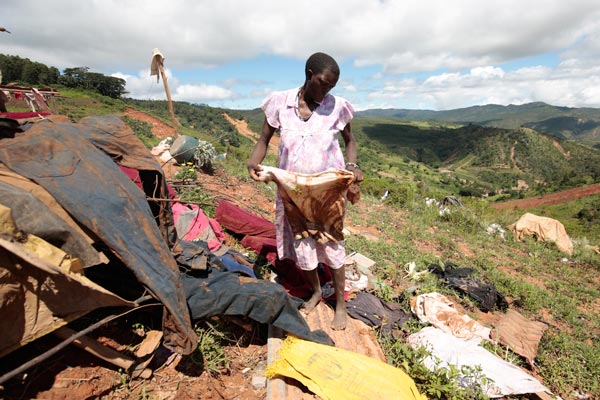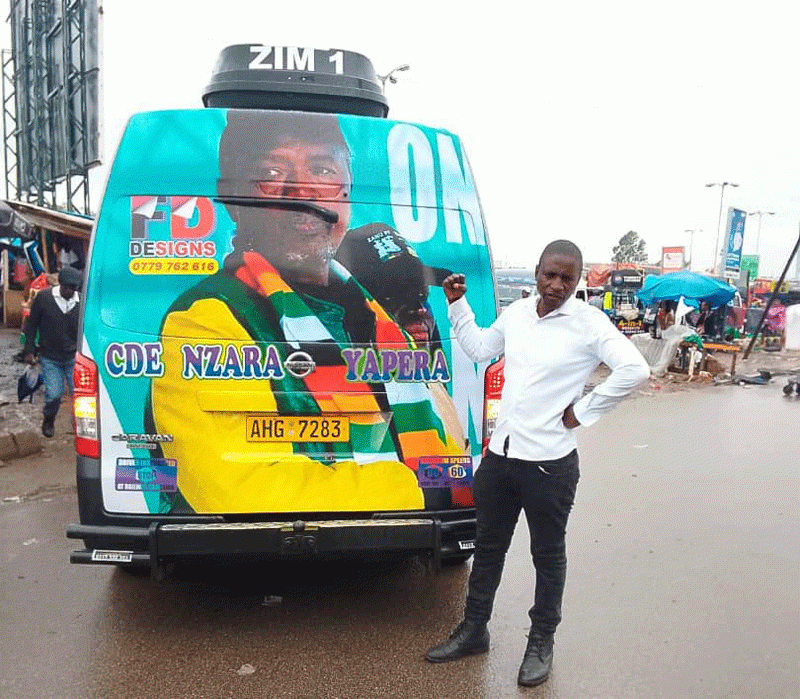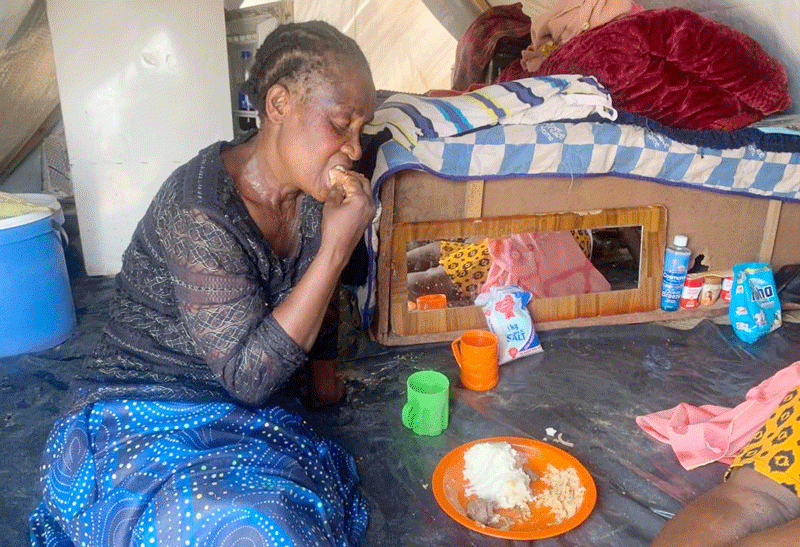
the big interview:BY JOHN CASSIM
In eastern Zimbabwe’s Chimanimani district, a disaster — Cyclone Idai — that made a landfall slightly more than a year ago has exposed survivors to yet another calamity — the new coronavirus pandemic.
The first disaster was largely natural. The cyclone pounced on parts of eastern Zimbabwe and surrounding areas with a fury that literally buried people alive in rubble and submerged hundreds of houses, washing bodies away into the Indian Ocean.
It left some 300 people dead, severely damaged water, power, health, education and public transport infrastructure and more than 600 families were rendered homeless.
The second disaster would be largely man-made, thanks to corruption, plunder of aid and a bad disaster recovery process relating to the first.
The coronavirus outbreak that recorded more than two million cases globally and killed at least 145 000 people by April 17, according to CNN, can easily spread among the affected survivors of Cyclone Idai in a country which has already lost three lives while cases continue rising as government up-scales testing.
An investigation supported by Information for Development Trust, a non-profit organisation helping journalists probe bad governance, discovered that the affected families are still living in crowded makeshift tent camps in Ngangu where Idai wreaked havoc from March 14, 2019.
They have heard about Covid-19 on radio, but no one has bothered to educate them about the pandemic, have only heard about sanitisers and move around freely.
- Chamisa under fire over US$120K donation
- Mavhunga puts DeMbare into Chibuku quarterfinals
- Pension funds bet on Cabora Bassa oilfields
- Councils defy govt fire tender directive
Keep Reading
A visit prior to the current Covid-19 lockdown revealed that when it rains, the tents leak because rats ate into them and floors are cracking.
Some of the shelters have collapsed and the occupants, children included, are literally living in the open, while food distribution and water supplies have become erratic amid fears that the situation could worsen as the development community has shifted attention to the coronavirus outbreak.
In the early days, there was a flurry of promises and pretence by the Zimbabwean government, humanitarian agencies, embassies and local business to relocate the victims and help them recover from Cyclone Idai losses.
President Emmerson Mnangagwa even cut short an official trip to the United Arab Emirates and, sitting on a sofa after flying in using a helicopter, told the victims in Ngangu on March 20 last year that they would all be resettled in appropriate areas.
A plan by Econet Wireless Zimbabwe, the leading telecommunications company, to build 500 houses for Cyclone Idai victims on a site it had already named Memorial Estate on Westend Farm in Chimanimani fell through an ice hole amid allegations of corruption.
Government gave Econet an offer letter for the development of a new settlement on Memorial Estate two months after Cyclone Idai struck, investigations revealed.
The mobile communications company proceeded to design a settlement plan for the beneficiaries.
However, under unclear circumstances, the government subsequently informed Econet that it was taking back Memorial Estate and asked the company to hand over the settlement plan, even though it has not officially withdrawn the offer letter to date.
Econet was prepared to turn the farm into a modern location with water, power and all the amenities necessary for a modern township, complete with site, housing and road plans, sources revealed.
The company was, however, frustrated when government officials allegedly tried to force it to award procurement contracts to powerful individuals.
“Econet was doing everything on their own towards the construction of the 500 houses, but they were asked by top government officials to sub-contract to friends of certain ministers for the procurement of building materials,” a close source told The Standard.
It is understood Econet wrote a letter of complaint to Local Government, Public Works and National Housing minister July Moyo expressing their concerns over the corruption allegations.
Moyo, however, refused to comment on the Econet issue.
Econet spokesperson Fungayi Mandiveyi confirmed that they were no longer part of the relocation programme, but refused to comment on the alleged corruption.
“All I can tell you is that Econet is no longer taking part in that project,” Mandiveyi said in a telephone interview.
“We did not pull out as alleged, but on corruption and intimidation allegations I cannot comment.”
But our sources insisted that the Econet “pullout” was forced as the company could not withdraw from the project to which it had already committed resources, complete with the settlement plans.
Joshua Sacco, the ruling Zanu PF Member of Parliament for Chimanimani, also confirmed the Econet withdrawal, but seemed to blame the mobile communications company.
“You raise an important issue on Econet,” Sacco said. “They actually pulled out at the last minute and this caused a serious problem for us.”
It is not the first time that corruption has confronted Econet in its humanitarian interventions.
In 2018, Strive Masiyiwa, the Econet Group executive chairman, revealed through Twitter that officials at the Harare municipality were inflating prices of commodities when his company availed US$10 million to fight a cholera outbreak that affected 10 200 people and killed 55.
Econet was funding the purchase of items needed to fight the cholera outbreak.
“One of the saddest things that happened last week when Econet announced that it had set aside $10 million to help with support to buy medicines and materials, was the number of suppliers and even medical officials in some of the affected municipalities, who tried to defraud our company by offering things at highly inflated prices,” said Masiyiwa in a tweet at the time.
Several municipal employees were arrested and prosecuted for the alleged fraud.
A similar deal with the Chinese government has hit a rough patch.
A month after Cyclone Idai made landfall in March 2019, Beijing tasked six Chinese companies operating in Zimbabwe to repair damaged roads and construct new houses using their own resources, and pledged to reimburse them.
The Chinese embassy has denied pulling out or encountering the alleged corruption, but none of the companies it asked to help has done any visible work to rehabilitate the Ngangu survivors.
Engineers at Nhedziwa, the site where government has shifted its relocation plans after mysteriously reversing the Memorial Estate project and is targeting to build 633 houses for Idai survivors, claimed that the Chinese companies would help connect potable water at the project.
The Chinese embassy’s commercial consular, Zou Xiaoming, however, said China might delay the building of houses as they were overwhelmed by the current Covid-19 pandemic.
China, where the coronavirus originated, recently helped reconstruct Wilkins Hospital, the Covid-19 referral centre in Harare, within a short time.
Zou said they were still doing physical assessments regarding the construction of houses in Chimanimani, but did not explain the year-long delay.
There are conflicting signals on who must benefit from the relocation project while the process of verifying who must be relocated is still unfinished.
Panganai Chirongera, the Chamanimani councillor for ward 15 where the victims are currently staying, reiterated Mnangagwa’s position last year that relocation would benefit all the internally displaced persons (IDPs) in one go.
“Every IDP will be considered,” Chirongera said. “The list of potential beneficiaries is not yet complete because the verification process is still in progress.”
Verification, The Standard established, involves establishing the names of survivors, their national identity numbers where applicable and number of families at every destroyed house, tenants included.
Other government officials, however, have been insisting that the process has been accomplished and what remains is to allocate the beneficiaries the houses.
The government, through the local authority, is targeting 633 beneficiaries for Nedziwa and that is the estimated number of families that owned houses that were damaged by the cyclone.
But the number of families needing new shelter is estimated at well above 1 000 since some of the people who were affected were tenants.
Sacco, however, insisted that the tenants would be considered for relocation under the second phase of the project, but no government official has to date announced that resettlement would be phased.
Meanwhile, Idai survivors are concerned that the site at Nhedziwa is a wetland, and Tinashe Lenin Chisaira, the director of Advocates4Earth, a non-profit environmental law, climate and wildlife justice organisation, confirmed the same to The Standard.
But Moyo, the Local government minister, denied the claim.
“We did a geo-physical mapping for Chimanimani,” Moyo said. “I can tell you that the place is not a wetland,” he said, and referred further questions to Ellen Gwaradzimba, the Manicaland Provincial Affairs minister.
Gwaradzimba reiterated that former Ngangu tenants would also be resettled, but, in a new twist to the relocation saga, said that the resettlement would no longer happen at Nhedziwa.
Instead, she said, they were going back to West End Farm where Econet had originally intended to resettle the Cyclone Idai victims.
She apparently admitted that Nhedziwa was a wetland.
“We are going to consider those houses that are in risky areas,” Gwaradzimba said.
“Government has taken upon itself to construct the houses.
“So far, $1.7 million has been received from government for the construction of permanent houses.
“Government has of late decided to construct the houses at West End in Chimanimani and not at Nhedziwa.”
The decision to return to West End has set the relocation process in confusion since authorities in Chimanimani had already allocated housing unit numbers to 633 people in Nhedziwa.
These beneficiaries are unsettled by the Chimanimani Rural District Council’s decision to sell them — instead of offering them for free — the new houses.
A letter from the council’s CEO Nehemiah Deure, dated March 4, 2020, shows that the beneficiaries will have to pay an initial 10% of the total land purchase price and the balance upon completion of the construction of the houses.
‘Payment of unit tax will be paid (sic) with effect from 2020,” the letter reads.
But, the beneficiaries pointed out, the land in Nhedziwa had not be evaluated to establish its real commercial value.
The survivors’ plight has been worsened by the fact that the local authority is insisting that they must pay for outstanding service charges in Ngangu, despite the severe losses they suffered when the cyclone hit them.
“Outstanding service charges arrears on the previous damaged stand shall be paid in full.
“A payment plan shall be accepted,” reads Deure’s letter, which further states that properties partially damaged by Cyclone Idai would be forfeited by council upon renovation.
“If they are asking me to pay for the relocation to another place, that’s not fair.
“It means, all my life, I will be building another house,” one female victim remonstrated.
Gwaradzimba ignored questions sent to her regarding this matter.
The survivors have accused the ruling Zanu PF and authorities of looting aid meant for them, with some alleging that the loot was also being diverted to local businesspeople for sale.
During the pre-lockdown visit, The Standard was led to a shop owned by one Taso at the rural Biriri shopping centre.
There, the investigation discovered that Taso was selling metal pots, blankets and other items that a local villager had claimed had been diverted from beneficiaries. Taso failed to prove where he had purchased them from.
Junior soldiers at Ngangu were also implicated in the diversion of food and other forms of aid, and unwittingly admitted to The Standard their bosses had given them the go-ahead to loot for as long as they would not be caught.
Sacco, however, denied that Zanu PF members were involved in the plunder.
An elderly woman accused Chirongera, the ward 15 councillor, of collecting bribes from the villagers to facilitate their relocation or get aid.
But Chirongera denied the allegations. “I never distributed anything in the tents,” he said. “I am not collecting money from anyone.”
Parliament has been seized with the Cyclone Idai survivors’ plight, as shown by the Hansard of March 11, 2020, with legislators worried that relocation is taking too long.









